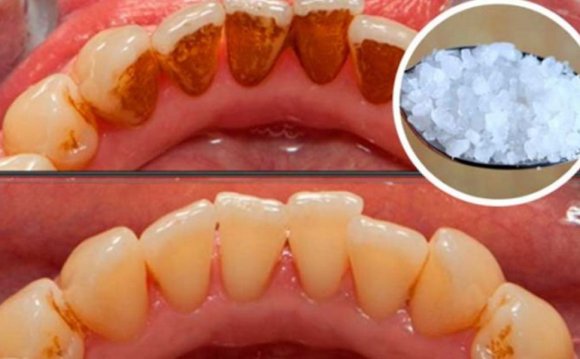
When brushing twice a day and flossing doesn't help improve your yellow teeth, it's time to consider other options. Teeth become yellow due to stains – both deep and surface-level – as well as other causes that sometimes aren't under our control. Whether the discoloration is due to staining or other factors, several over-the-counter (OTC) products can improve tooth color, and your dentist can also offer preventative advice on how to whiten yellow teeth.
What Causes Yellow Teeth?
Although coffee and cigarettes leave stains on your teeth over time, thin tooth enamel also makes teeth look yellow. Tooth enamel is the hard, white surface of your teeth, and underneath it is a pale brown substance called dentin. Thick enamel looks white, but thin enamel allows dentin tones to show through, making teeth look yellow from the outside. Enamel naturally wears thin as people age, but acids from foods and drinks such as sour candies, oranges and soda also thin the enamel by eroding its surface. Carole Palmer, head of the Division of Nutrition and Oral Health Promotion at Tufts University, tells Tufts Now that even chewable vitamin C tablets are acidic.
Saliva neutralizes acid and washes it away, but people suffering from dry mouth miss out on this protective effect. For example, children who breathe through their mouths due to blocked nasal passages can prevent saliva from remoisturizing the mouth when it's closed – putting them at risk of developing thin tooth enamel. Medline Plus says that in rare cases, inherited diseases also cause very thin enamel.
Other Causes
Other causes of yellow teeth include antibiotic use or excessive fluoride intake in young children, which can cause yellow-stained adult teeth later. However, according to dentistry professor Mauli Simrativir, antibiotics and high fluoride levels cause blotching, rather than an overall yellow tone to the teeth. Sometimes yellow teeth just run in the family.
Preventing Yellow Teeth
Avoiding smoking, coffee and soda helps prevent yellow teeth, or you can get into the habit of drinking those darker beverages through a straw. Drink milk or plain water after eating or drinking something acidic to help reduce the acid's eroding effect. Brushing and flossing also help, and avoiding snacks between meals allows your saliva to dilute the acids in your mouth too.
If you're concerned that you or your child suffers from dry mouth, consult your doctor, and always use fluoride products per your dentist's advice.
OTC products such as Colgate® Optic White™ Toothbrush and Whitening Pen can lift yellow tones in your teeth by removing stains and providing a mild bleaching effect when used as directed. Other products include whitening trays and even mouthrinses.
Discolorations are generally responsive to bleaching procedures, and dentists can advise on how to whiten yellow teeth depending on your case. Your dentist can provide bleaching kits to take home and use over a period of time, as well as in-office bleaching procedures. However, he or she might recommend waiting until all your child's permanent front teeth have appeared before using a bleaching treatment, so that newer teeth aren't a different color than bleached baby teeth.









